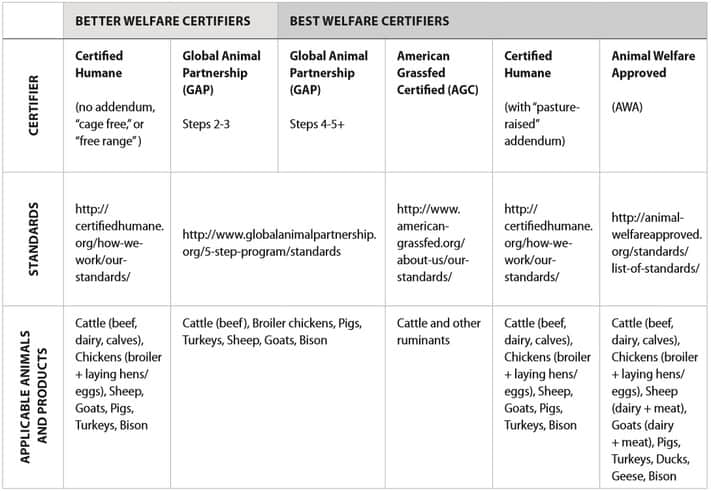Reading Labels
What does ‘free-range’ mean, anyway? In recent years, there has been a sharp increase in the number of labels placed on all kinds of food products, including beef, chicken, fish, dairy, and eggs. Many of these labels, like “all-natural”, “farm fresh”, and “humanely raised” are completely meaningless; other labels might refer to something about the product, but are meaningless with regard to animal welfare, such as grass-fed, vegetarian-fed, all-natural, organic, cage-free, free-range, free roaming, pasture-raised, humanely raised, farm fresh, omega-3 enriched, pasteurized (for a more comprehensive guide to labels, visit AWI’s Food Label Guide: https://awionline.org/foodlabelguide).
Welfare Certifications
Third-party animal welfare certifications help us understand the conditions in which farmed animals live out their lives. Third-party auditors inspect farms to make sure that they meet certain standards, but these standards can range from simply ensuring that standard factory farming procedures are followed to requiring animals be raised in higher welfare pasture-based systems. Unfortunately, many alleged “certifications” are little more than advertisements. Fortunately, there are three major certifications–Certified Humane, Global Animal Partnership (GAP), and Animal Welfare Approved (AWA)–that are widely recognized as legitimate by animal protection groups. At this time, no certification process exists to ensure more humane raising and slaughter of farmed fish or more humane methods of catching wild fish, but we will likely see them in the future (see Food from Farmed Animals).
For quick, general information use this chart. For more detailed information, see the label-by-label explanation below.

Better:
- Certified Humane audits farmed animal operations that are typically on the better end of the factory farming spectrum. Standards include minimum space requirements, provisions for indoor housing requirements, and requirements for slaughter. However, there are areas where the standards do not require more than the industry norm. Chickens and turkeys, for example, are not required to be granted access to the outdoors, making it possible that animals with the Certified Humane label were confined indoors for their entire lifespan. If, in addition to the Certified Humane label, a Certified Humane poultry product is listed as “free range,” then the birds also have access to the outdoors.
- Global Animal Partnership (GAP) Steps 2-3 provide similar levels of welfare as Certified Humane. The GAP label is a tiered rating system, where Step 1 is the lowest rating and Step 5+ is the highest rating. GAP Step 1 is currently not much of an improvement, but Step 2 assures similar levels of welfare as the Certified Humane program. Step 2 represents better standards of care compared to the industry norm, but, as with Certified Humane, many welfare concerns important to consumers are not addressed, such as outdoor access. GAP Step 3 adds outdoor access and a few additional welfare benefits to Step 2 and is roughly comparable to Certified Humane products also marked as “free range.”
Best Available:
- Global Animal Partnership (GAP) Steps 4-5+ represent the high end of currently available welfare. At Step 4 animals are raised on pasture. At Step 5, no physical alterations are performed on the animals. At Step 5+, the entire life of the animal must be spent on the same integrated farm (transport is not allowed).
- American Grassfed Certified does not aim at being a welfare certification but nonetheless correlates with higher welfare.This certification ensures that all ruminant animals were fed a lifetime diet of 100% forage, were raised on pasture and not in confinement, and were never treated with hormones or antibiotics. All beef cattle spend some time on grass, so it is important to understand that a promise of “grass-fed” alone does not indicate higher welfare; 100% grass-fed beef is where the greatest welfare benefits occur. Unfortunately, American Grassfed Certified does not include humane slaughter standards and so we recommend inquiring about slaughter standards for products bearing this label.
- Certified Humane with a “Pasture-Raised” addendum on poultry products means that, in addition to meeting basic standards, birds must be given a certain amount of space (108 sq.ft. per animal, compared to 2 sq.ft. for “free-range” animals) and fields must be rotated. Hens must be kept outdoors year-round with mobile or fixed housing.
- The Animal Welfare Approved (AWA) (www.animalwelfareapproved.org) label, along with GAP 5+, represent a gold standard in animal welfare. Animals are raised on a family farm with meaningful welfare protections, access to pasture, and careful handling during transportation and slaughter. Compliance is verified through an onsite audit conducted by trained staff of AWA. AWA is also the only program that is free for farmers, which makes us recommend this certification above all others.



